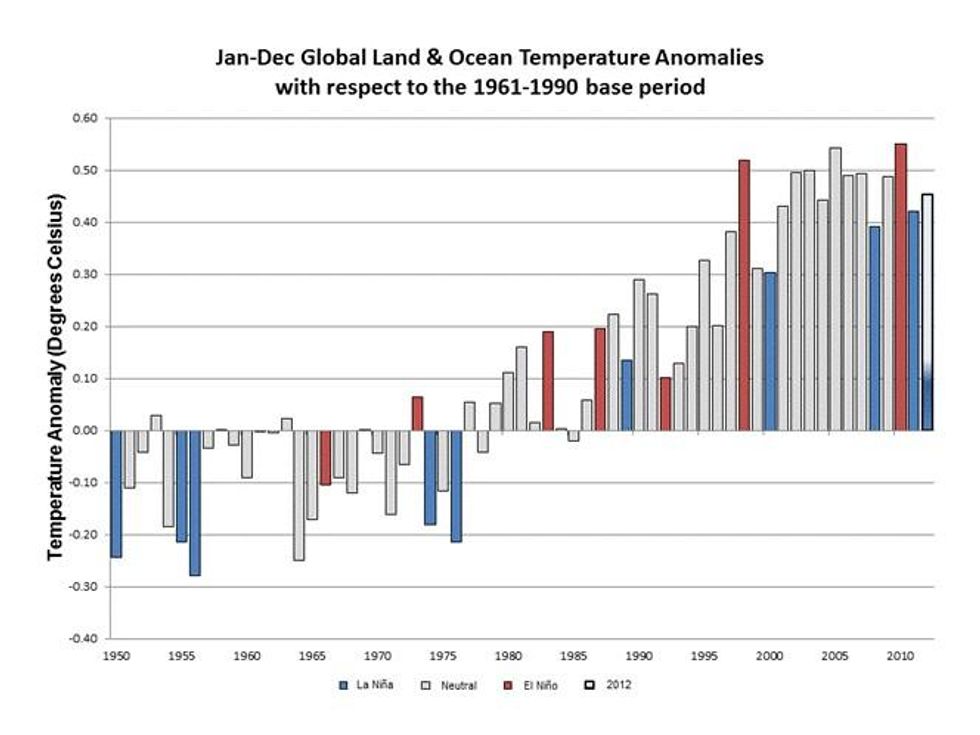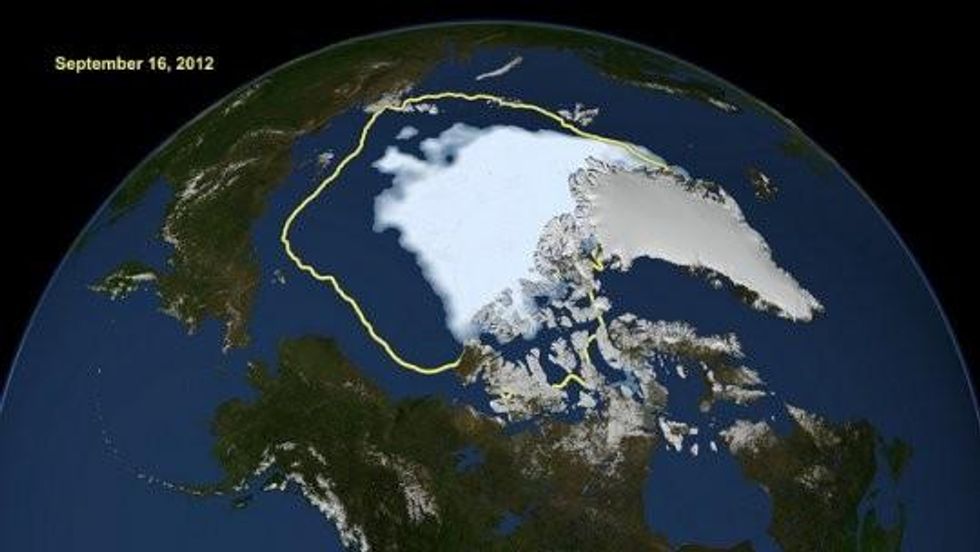

SUBSCRIBE TO OUR FREE NEWSLETTER
Daily news & progressive opinion—funded by the people, not the corporations—delivered straight to your inbox.
5
#000000
#FFFFFF
To donate by check, phone, or other method, see our More Ways to Give page.


Daily news & progressive opinion—funded by the people, not the corporations—delivered straight to your inbox.

The bleak assessment comes from the UN's World Meteorological Organization (WMO) as part of its annual climate statement.
"Although the rate of warming varies from year to year due to natural variability caused by the El Nino cycle, volcanic eruptions and other phenomena, the sustained warming of the lower atmosphere is a worrisome sign," said WMO Secretary-General Michel Jarraud.
2012 was also the 27th consecutive year global land and ocean temperatures were above the 1961-1990 average.
"The record loss of Arctic sea ice in August-September -- 18% less than the previous record low of 2007 of 4.17 million km2 -- was also a disturbing sign of climate change," he added.

In addition to the Arctic sea ice loss, "The year 2012 saw many other extremes as well, such as droughts and tropical cyclones," stated Jarraud.
The WMO states that the drought that plagued much of the contiguous U.S. throughout 2012 and contributed to wildfires affected 164 million people and was a multi-billion dollar disaster.
In its "Status of the global climate in 2012," the WMO outlines the 10 major weather and climate events of 2012:
* Global temperature continued to record positive anomalies; 2012 ranked among the 10 warmest years on record (base period: 1961-1990).
* Arctic sea ice continued its fast decline, reaching the lowest minimum sea-ice extent on record.
* Extreme heat affected Canada, the United States and Europe.
* Extreme drought conditions affected the United States and south-eastern Europe.
* West Africa was severely hit by extreme flooding.
* The populations of Europe, northern Africa and northern Asia were acutely affected by extreme cold and snow conditions.
* Pakistan was affected by severe flooding for a third consecutive year.
* Hurricane Sandy, the costliest tropical cyclone of the year, ravaged the eastern seaboard of the United States.
* Typhoon Bopha, the deadliest tropical cyclone of the year, hit the Philippines in December.
* The polar ozone hole was the second smallest in the past 20 years.
As the trends "confirm that the warming will continue," Jarraud urges continued investments "in the observations and research that will improve our knowledge about climate variability and climate change."
"We need to understand how much of the extra heat captured by greenhouse gases is being stored in the oceans and the consequences this brings in terms of ocean acidification and other impacts. We need to know more about the temporary cooling effects of pollution and other aerosols emitted into the atmosphere," stated Jarraud.
"We also need a better understanding of the changing behaviour of extreme weather and climate events as a consequence of global warming, as well as the need to assist countries in the most affected areas to better manage climate-related risks with improved climate early warning and climate watch systems," he said.
____________________________
Dear Common Dreams reader, The U.S. is on a fast track to authoritarianism like nothing I've ever seen. Meanwhile, corporate news outlets are utterly capitulating to Trump, twisting their coverage to avoid drawing his ire while lining up to stuff cash in his pockets. That's why I believe that Common Dreams is doing the best and most consequential reporting that we've ever done. Our small but mighty team is a progressive reporting powerhouse, covering the news every day that the corporate media never will. Our mission has always been simple: To inform. To inspire. And to ignite change for the common good. Now here's the key piece that I want all our readers to understand: None of this would be possible without your financial support. That's not just some fundraising cliche. It's the absolute and literal truth. We don't accept corporate advertising and never will. We don't have a paywall because we don't think people should be blocked from critical news based on their ability to pay. Everything we do is funded by the donations of readers like you. Will you donate now to help power the nonprofit, independent reporting of Common Dreams? Thank you for being a vital member of our community. Together, we can keep independent journalism alive when it’s needed most. - Craig Brown, Co-founder |

The bleak assessment comes from the UN's World Meteorological Organization (WMO) as part of its annual climate statement.
"Although the rate of warming varies from year to year due to natural variability caused by the El Nino cycle, volcanic eruptions and other phenomena, the sustained warming of the lower atmosphere is a worrisome sign," said WMO Secretary-General Michel Jarraud.
2012 was also the 27th consecutive year global land and ocean temperatures were above the 1961-1990 average.
"The record loss of Arctic sea ice in August-September -- 18% less than the previous record low of 2007 of 4.17 million km2 -- was also a disturbing sign of climate change," he added.

In addition to the Arctic sea ice loss, "The year 2012 saw many other extremes as well, such as droughts and tropical cyclones," stated Jarraud.
The WMO states that the drought that plagued much of the contiguous U.S. throughout 2012 and contributed to wildfires affected 164 million people and was a multi-billion dollar disaster.
In its "Status of the global climate in 2012," the WMO outlines the 10 major weather and climate events of 2012:
* Global temperature continued to record positive anomalies; 2012 ranked among the 10 warmest years on record (base period: 1961-1990).
* Arctic sea ice continued its fast decline, reaching the lowest minimum sea-ice extent on record.
* Extreme heat affected Canada, the United States and Europe.
* Extreme drought conditions affected the United States and south-eastern Europe.
* West Africa was severely hit by extreme flooding.
* The populations of Europe, northern Africa and northern Asia were acutely affected by extreme cold and snow conditions.
* Pakistan was affected by severe flooding for a third consecutive year.
* Hurricane Sandy, the costliest tropical cyclone of the year, ravaged the eastern seaboard of the United States.
* Typhoon Bopha, the deadliest tropical cyclone of the year, hit the Philippines in December.
* The polar ozone hole was the second smallest in the past 20 years.
As the trends "confirm that the warming will continue," Jarraud urges continued investments "in the observations and research that will improve our knowledge about climate variability and climate change."
"We need to understand how much of the extra heat captured by greenhouse gases is being stored in the oceans and the consequences this brings in terms of ocean acidification and other impacts. We need to know more about the temporary cooling effects of pollution and other aerosols emitted into the atmosphere," stated Jarraud.
"We also need a better understanding of the changing behaviour of extreme weather and climate events as a consequence of global warming, as well as the need to assist countries in the most affected areas to better manage climate-related risks with improved climate early warning and climate watch systems," he said.
____________________________

The bleak assessment comes from the UN's World Meteorological Organization (WMO) as part of its annual climate statement.
"Although the rate of warming varies from year to year due to natural variability caused by the El Nino cycle, volcanic eruptions and other phenomena, the sustained warming of the lower atmosphere is a worrisome sign," said WMO Secretary-General Michel Jarraud.
2012 was also the 27th consecutive year global land and ocean temperatures were above the 1961-1990 average.
"The record loss of Arctic sea ice in August-September -- 18% less than the previous record low of 2007 of 4.17 million km2 -- was also a disturbing sign of climate change," he added.

In addition to the Arctic sea ice loss, "The year 2012 saw many other extremes as well, such as droughts and tropical cyclones," stated Jarraud.
The WMO states that the drought that plagued much of the contiguous U.S. throughout 2012 and contributed to wildfires affected 164 million people and was a multi-billion dollar disaster.
In its "Status of the global climate in 2012," the WMO outlines the 10 major weather and climate events of 2012:
* Global temperature continued to record positive anomalies; 2012 ranked among the 10 warmest years on record (base period: 1961-1990).
* Arctic sea ice continued its fast decline, reaching the lowest minimum sea-ice extent on record.
* Extreme heat affected Canada, the United States and Europe.
* Extreme drought conditions affected the United States and south-eastern Europe.
* West Africa was severely hit by extreme flooding.
* The populations of Europe, northern Africa and northern Asia were acutely affected by extreme cold and snow conditions.
* Pakistan was affected by severe flooding for a third consecutive year.
* Hurricane Sandy, the costliest tropical cyclone of the year, ravaged the eastern seaboard of the United States.
* Typhoon Bopha, the deadliest tropical cyclone of the year, hit the Philippines in December.
* The polar ozone hole was the second smallest in the past 20 years.
As the trends "confirm that the warming will continue," Jarraud urges continued investments "in the observations and research that will improve our knowledge about climate variability and climate change."
"We need to understand how much of the extra heat captured by greenhouse gases is being stored in the oceans and the consequences this brings in terms of ocean acidification and other impacts. We need to know more about the temporary cooling effects of pollution and other aerosols emitted into the atmosphere," stated Jarraud.
"We also need a better understanding of the changing behaviour of extreme weather and climate events as a consequence of global warming, as well as the need to assist countries in the most affected areas to better manage climate-related risks with improved climate early warning and climate watch systems," he said.
____________________________